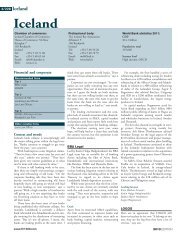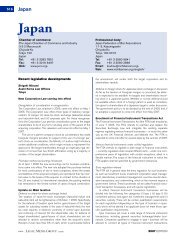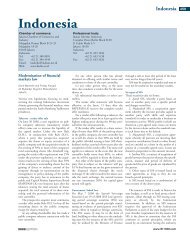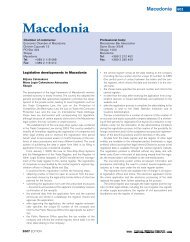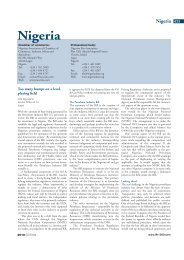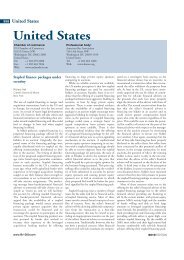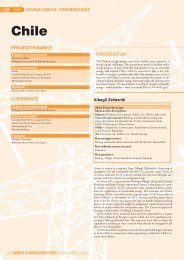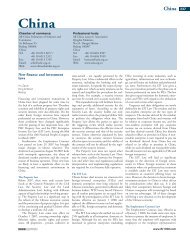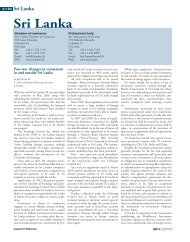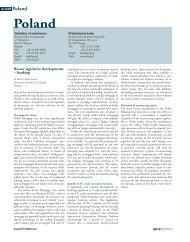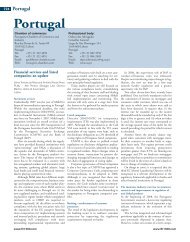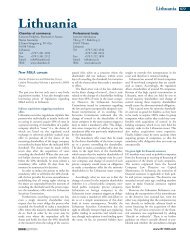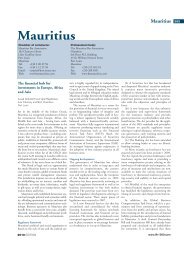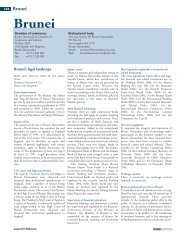tunisian chamber of commerce and - IFLR1000
tunisian chamber of commerce and - IFLR1000
tunisian chamber of commerce and - IFLR1000
You also want an ePaper? Increase the reach of your titles
YUMPU automatically turns print PDFs into web optimized ePapers that Google loves.
960<br />
Tunisia<br />
Tunisia<br />
Chamber <strong>of</strong> <strong>commerce</strong>:<br />
Tunisian Chamber <strong>of</strong> Commerce <strong>and</strong> Industry<br />
6 rue des Entrepeneurs<br />
1000 Tunis<br />
Tunisia<br />
Tel: +21 67 350 300<br />
Fax: +21 67 332 968<br />
Email: ccitunis@planet.tn.<br />
The privatization process<br />
Abdelly Samir<br />
Abdelly & Associates<br />
Tunis<br />
Privatization <strong>and</strong> public-private partnerships (PPP) in Tunisia have<br />
been enhanced recently, as a result <strong>of</strong> the reduction in government<br />
intervention in numerous sectors.<br />
Since 1987, <strong>and</strong> pursuant to the plan <strong>of</strong> structural adjustment initiated<br />
in 1986, Tunisia started to open up state-owned company<br />
capital to national <strong>and</strong> foreign private investors. This process has<br />
now reached maturity; private companies are no longer operating in<br />
the red, but are generally pr<strong>of</strong>itable.<br />
By the end <strong>of</strong> 2005, 194 companies had been privatized at a<br />
total value <strong>of</strong> TND2.4 billion ($1.8 billion). In 2006 Tunisia undertook<br />
its biggest-ever privatization operation in terms <strong>of</strong> value, the privatization<br />
<strong>of</strong> 35% <strong>of</strong> Tunisie Telecom, the national telecommunications<br />
company, representing almost twice as much as all other privatizations<br />
since 1987 combined.<br />
The privatization process has introduced certain businesses into<br />
the private sector which were up until this point exclusively public<br />
sector businesses, such as the conditioning <strong>of</strong> minerals, l<strong>and</strong> transportation,<br />
transport <strong>of</strong> goods, telecommunications <strong>and</strong> education. To<br />
achieve these operations, the Tunisian government has implemented<br />
a raft <strong>of</strong> legislation covering the procedures <strong>and</strong> conditions <strong>of</strong><br />
transfers <strong>of</strong> shares or titles held by the state, so as to facilitate the<br />
development <strong>of</strong> a free-market economy.<br />
Legal framework<br />
The main piece <strong>of</strong> legislation covering privatization is Law 89-9 <strong>of</strong><br />
February 1 1989 relating to participations, companies <strong>and</strong> publiclyowned<br />
establishments (Law 89-9). Pursuant to articles 24 to 27 <strong>of</strong><br />
Law 89-9, any transfer <strong>of</strong> shares or exchange <strong>of</strong> company titles in<br />
which the state holds a direct participation must obtain approval<br />
from the Commission <strong>of</strong> Stabilization <strong>and</strong> Reorganization <strong>of</strong> Public<br />
Participation Companies (Commission d’Assainissement et de<br />
Restructuration des Entreprises à Participation Publique)<br />
(CAREPP), although the final decision lies with the prime minister.<br />
The company being privatized is granted special tax advantages<br />
– a key factor in encouraging private initiative <strong>and</strong> attracting foreign<br />
investment into Tunisia. Pursuant to articles 29, 30 <strong>and</strong> 32 <strong>of</strong> Law<br />
89-9, privatized businesses enjoy several tax exemptions, including:<br />
• Fiscal relief on the benefit or reinvested income;<br />
• Exemption from partition duties relating to the reduction <strong>of</strong> the<br />
capital;<br />
• Exemption from registration duties on operations relating to real<br />
estate <strong>and</strong> goodwill transfer;<br />
• Exemption from company income tax for a certain period;<br />
• Exemption from capital gains tax on transfers carried out by the<br />
assignor companies; <strong>and</strong><br />
• otal or partial exemptions from share transfer stock exchange<br />
taxes.<br />
These advantages are granted on a case by case basis by the<br />
prime minister, following guidance from the CAREPP.<br />
Procedures <strong>and</strong> methods <strong>of</strong> privatization<br />
Privatization must be a financially attractive proposition for both the<br />
state <strong>and</strong> private investors. A preliminary evaluation <strong>of</strong> the target<br />
company is therefore necessary, as well as a more detailed audit<br />
carried out by the potential purchasers.<br />
The privatization process begins by the minister <strong>of</strong> development<br />
deciding to consider the capital restructuring <strong>of</strong> a company. Then,<br />
the Tunisian authority proceeds to the evaluation <strong>of</strong> the titles or<br />
assets <strong>of</strong> the company, <strong>and</strong> the General Privatization Department<br />
undertakes a financial <strong>and</strong> technical study to decide upon the final<br />
strategy to be adopted.<br />
The file is then submitted to both the Technical Privatization<br />
Committee <strong>and</strong> the CAREPP for opinion (bearing in mind that the<br />
final decision rests with the prime minister).<br />
Apart from share transfers to employees, all transactions conducted<br />
within the framework <strong>of</strong> a privatization must be carried out<br />
by a competition procedure, or more exactly according to one <strong>of</strong> the<br />
following options:<br />
• Market best <strong>of</strong>fer transfer (cession au mieux du marché);<br />
• Public call sale transfer (cession par <strong>of</strong>fer publique de vente);<br />
• Negotiated transfer (cession de gré à gré); or<br />
• A combination <strong>of</strong> all these methods.<br />
Article 33-4 <strong>of</strong> Law 89-9 allows for the transfer <strong>of</strong> blocks <strong>of</strong><br />
shares through an invitation to tender on the basis <strong>of</strong> required specifications.<br />
Concessions consist <strong>of</strong> a transfer <strong>of</strong> management, <strong>and</strong> the transfer<br />
<strong>of</strong> an activity, from a public entity to a private entity for a determined<br />
period. It can also take the form <strong>of</strong> private investment in certain<br />
activities or sectors that are usually the reserve <strong>of</strong> the public<br />
sector. These techniques (build-own-operate, build-operate-transfer<br />
etc) are increasingly important because <strong>of</strong> the size <strong>of</strong> the projects<br />
which are under development <strong>and</strong> the number <strong>and</strong> the extent <strong>of</strong> the<br />
interested sectors.<br />
The Tunisian authorities have recently awarded concessions<br />
relating to the Radès power plant <strong>and</strong> the Onas project; the concession<br />
for the Skhira refinery is pending at the time <strong>of</strong> writing.<br />
The biggest Tunisian privatization, undertaken over the past few<br />
months, has been that <strong>of</strong> the national telecommunications operator,<br />
2007 EDITION
Tunisia<br />
961<br />
Tunisie Telecom. The privatization, under which 35% <strong>of</strong> the company’s<br />
share capital has been transferred, generated considerable<br />
income for the government <strong>and</strong> has been considered fully successful.<br />
For this operation, the Tunisian government was looking for a<br />
strategic partner to contribute to the success <strong>of</strong> Tunisia’s most<br />
pr<strong>of</strong>itable company. From this we can conclude that government<br />
policy is tending to favour the PPP approach rather than the pure<br />
privatization model.<br />
Corporate <strong>and</strong> commercial<br />
Recommended firms<br />
Tier 1<br />
Abdelly & Associates<br />
Adly Bellagha & Associates<br />
Ferchiou & Associés Meziou Knani<br />
Salaheddine Caid Essebsi & Associates<br />
Tier 2<br />
Kallel & Associates<br />
Mili & Associates<br />
Tier 3<br />
Mahbouli & Associates<br />
Mallouche & Associés<br />
Abdelly & Associates<br />
With over 80 years <strong>of</strong> legal practice under its belt, Abdelly &<br />
Associates is well-equipped to <strong>of</strong>fer a wide range <strong>of</strong> financial law<br />
services. For example, it has vast experience <strong>of</strong> mergers <strong>and</strong> acquisitions,<br />
joint ventures <strong>and</strong> privatizations. It is also something <strong>of</strong><br />
an authority in banking, energy <strong>and</strong> telecommunications work.<br />
Samir Abdelly leads the firm from Tunis, but he also manages<br />
the firm’s other <strong>of</strong>fices in Algeria <strong>and</strong> Libya. Due to this international<br />
capacity, the firm wins a solid amount <strong>of</strong> project finance<br />
m<strong>and</strong>ates. In particular, Abdelly prides himself as a foreign investment<br />
expert. As a result, he h<strong>and</strong>les many instructions personally,<br />
<strong>and</strong> he has <strong>of</strong>ten been active in oil, mining <strong>and</strong> energy projects.<br />
Leading lawyer<br />
Samir Abdelly<br />
Key contact partner<br />
Samir Abdelly<br />
Adly Bellagha & Associates<br />
Adly Bellagha & Associates is a well-respected law firm that<br />
works out <strong>of</strong> its <strong>of</strong>fice in Tunis. It is made up <strong>of</strong> four partners <strong>and</strong><br />
two associates <strong>and</strong> provides excellent financial law advice, particularly<br />
in the hydrocarbon <strong>and</strong> telecommunications industries.<br />
Indeed, clients seem to be happy with the advice provided, one<br />
saying that the firm acted “with success <strong>and</strong> great efficiency.”<br />
Name partner Adly Bellagha is the lynchpin <strong>of</strong> the firm, <strong>and</strong><br />
clients are appreciative <strong>of</strong> the work that he does: “the advantage<br />
<strong>of</strong> Adly Bellagha is his very good knowledge <strong>of</strong> the situation in<br />
Algeria, <strong>and</strong> the fact that he can work in Arabic, French <strong>and</strong><br />
English.” With praise such as this, it is easy to see how the firm<br />
attracts clients like Citibank, the Arab Banking Corporation,<br />
Arab Tunisian Bank, SDV Tunisie, Etritech, Société Chimique<br />
<strong>and</strong> the Titan Cement Company.<br />
Over the past 12 months, Adly Bellagha & Associates has<br />
advised Saida <strong>and</strong> P&K Tunisie with regard to large loans, <strong>and</strong><br />
represented SCAC Tunisie in a complicated restructuring issue.<br />
SCAC Tunisie also hired the firm for due diligence work relating<br />
to the registration <strong>of</strong> a share assignment between non-resident<br />
shareholders with Bourse des Valeurs Mobilières.<br />
The firm was also heavily involved in the high-pr<strong>of</strong>ile privatization<br />
<strong>of</strong> Tunisie Telecom in March 2006. Hend Ben Achour <strong>and</strong><br />
Yassine El Hafi represented Oger Telecom <strong>and</strong> Adly Bellagha <strong>and</strong><br />
Faiza Telissi advised Telecom Italia in unsuccessful bids during<br />
the tender process.<br />
Leading lawyer<br />
Ably Bellagha<br />
Key contact partners<br />
Hend Ben Achour<br />
Yassine El Hafi<br />
Faiza Telissi<br />
Ferchiou & Associés Meziou Knani<br />
Three years after the merger <strong>of</strong> Ferchiou & Associés with Meziou<br />
Knani, the firm is now firmly established in the top tier in<br />
Tunisia. There four partners at the practice, who continue to be<br />
particularly well-regarded in the oil <strong>and</strong> energy arenas. The firm<br />
is also perceived as a telecommunications specialist, <strong>and</strong> is frequently<br />
seen in large privatizations <strong>and</strong> newsworthy mergers <strong>and</strong><br />
acquisitions transactions.<br />
This has certainly been the case in 2006. In July, the firm<br />
advised Tecom Investments <strong>and</strong> the Dubai Investment Group on<br />
the acquisition <strong>of</strong> 35% <strong>of</strong> the state-owned Tunisian telecoms<br />
operator Tunisie Telecom. Both clients are subsidiaries <strong>of</strong> Dubai<br />
Holding, <strong>and</strong> their second round bid <strong>of</strong> $2.2 billion won the tender<br />
process. This is the largest transaction ever seen in Tunisian<br />
history. Name partner Noureddine Ferchiou was instrumental to<br />
the success <strong>of</strong> this process, <strong>and</strong> peers describe him as “a most<br />
impressive lawyer due to the volume <strong>of</strong> work <strong>and</strong> revenue.”<br />
Leading lawyer<br />
Noureddine Ferchiou<br />
Key contact partner<br />
Noureddine Ferchiou<br />
Salaheddine Caid Essebsi & Associates<br />
Brothers Salaheddine <strong>and</strong> Beji Caid Essebsi are the two partners<br />
in charge <strong>of</strong> a seven-lawyer team at Salaheddine Caid Essebsi.<br />
Between the pair there is almost a hundred years <strong>of</strong> legal practice,<br />
so the firm is rich with experience. In addition, Beji is a former<br />
minister <strong>of</strong> foreign affairs <strong>and</strong> president <strong>of</strong> the House <strong>of</strong><br />
Representatives, <strong>and</strong> competitors call Salaheddine “the godfather<br />
<strong>of</strong> Tunisian law.” It is for these reasons that the firm has shot to<br />
the top tier in the rankings this year.<br />
Salaheddine Caid Essebsi & Associates markets itself as a general<br />
law firm with capabilities to <strong>of</strong>fer services in company, tax,<br />
commercial, trade, banking, foreign investments, trademark,<br />
hydrocarbon <strong>and</strong> arbitration issues.<br />
Along with Ferchiou & Associés Meziou Knani, the firm coadvised<br />
two Dubai Holding subsidiaries in relation to the $2.2<br />
billion acquisition <strong>of</strong> a 35% stake in Tunisie Telecom. This<br />
impressive transaction comprised a lengthy tender process that<br />
involved 13 invited bidders, <strong>of</strong> which only six decided to participate<br />
in the first round.<br />
Leading lawyers<br />
Beji Caid Essebsi<br />
Salaheddine Caid Essebsi<br />
Key contact partner<br />
Salaheddine Caid Essebsi<br />
2007 EDITION
962<br />
Tunisia<br />
Kallel & Associates<br />
With a frequent presence in privatizations by the Tunisian government,<br />
Kallel & Associates is sufficiently prepared to stake a<br />
claim for a place on the rankings. Despite being a smaller operation<br />
than some <strong>of</strong> its rivals, the two-partner Tunis firm maintains<br />
a healthy client list, which is mostly made up <strong>of</strong> local businesses<br />
but does include some multinational names too.<br />
The firm takes a generalist approach to financial law advice,<br />
<strong>and</strong> is just as comfortable representing its clients in M&A transactions<br />
as it is acting on a project financing. That said, Sami<br />
Kallel is well-known for his arbitration skills <strong>and</strong> his excellence at<br />
intellectual property. It is for these reasons that the market highlights<br />
Kallel as the firm’s leading lawyer.<br />
Leading lawyer<br />
Sami Kallel<br />
Key contact partner<br />
Sami Kallel<br />
Mili & Associates<br />
L<strong>of</strong>ti Blel, Mohammed Zied Chaabane <strong>and</strong> Faouzi Mili make up<br />
three-partner firm Mili & Associates. The trio specializes in completing<br />
intellectual property <strong>and</strong> competition m<strong>and</strong>ates,<br />
although they are also capable <strong>of</strong> fielding a team to act on most<br />
types <strong>of</strong> corporate <strong>and</strong> commercial transaction. For example, the<br />
firm regularly advises on foreign investment issues, real estate<br />
matters <strong>and</strong> multi-jurisdictional contracts.<br />
Mili & Associates has forged some excellent relationships with<br />
firms in the US, the UK, Jordan <strong>and</strong> Cyprus. Most importantly,<br />
it has a close relationship with French law firms such as Ayache<br />
& Salama, Cabinet Chaillot <strong>and</strong> Request Chabanel. In addition,<br />
Mili & Associates is the Tunisian law firm <strong>of</strong> choice for the<br />
French <strong>and</strong> Dutch embassies.<br />
International corporate clients <strong>of</strong> Mili & Associates include<br />
Euro RSCG Design from France, Japan’s Mitsui OSK Lines <strong>and</strong><br />
the UK’s Zeneca Pharmaceuticals. On the banking side, meanwhile,<br />
the client roster contains the likes <strong>of</strong> the World Bank <strong>and</strong><br />
Stichting Bevordering Chequeverkeer, the association <strong>of</strong> Dutch<br />
banks.<br />
Leading lawyer<br />
Faouzi Mili<br />
Key contact partner<br />
Faozi Mili<br />
2007 EDITION



